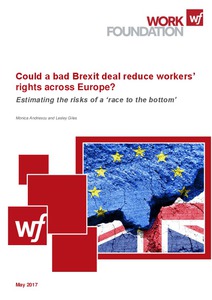Could a bad Brexit deal reduce workers’ rights across Europe? Estimating the risks of a ‘race to the bottom’
"The labour market deregulation reforms of the past decades have propelled the argument that globalisation may be driving a world-wide ‘race to the bottom’. Its predicted outcome is that, with increasing global competition, governments will face growing pressures to perpetually undercut each ot...
| Main Authors: | , |
|---|---|
| Institution: | ETUI-European Trade Union Institute |
| Format: | TEXT |
| Language: | English |
| Published: |
London
2017
The Work Foundation |
| Subjects: | |
| Online Access: | https://www.labourline.org/KENTIKA-634312445259-Could-a-bad-Brexit-deal-reduce.htm |
| Summary: | "The labour market deregulation reforms of the past decades have propelled the argument that globalisation may be driving a world-wide ‘race to the bottom’. Its predicted outcome is that, with increasing global competition, governments will face growing pressures to perpetually undercut each other by curtailing employment rights to attract higher foreign direct investment (FDI) levels. Greater FDI is believed to reinforce competitive advantage in the global market. On this reasoning, lower employment rights and labour costs (henceforth referenced as employment standards) are assumed to be the principal FDI determinant.
This report aims to review the basis for this position and assesses whether the empirical evidence is as straightforward as the prediction outlined above. It does so by specifically considering the European Union (EU) context and whether this hypothesis is likely to hold true in the case of Brexit. The report concludes that, while there is convincing evidence about converging trends of labour market deregulation and its negative effects on working individuals, the ‘race to the bottom’ hypothesis oversimplifies highly complex empirical developments. Furthermore, it discloses too little of the existing variation. We reviewed a range of academic studies and reports that use different datasets and indicators, study different regions, investigate FDI flows in different years and reveal mixed results. Some of them reinforce the ‘race to the bottom’ hypothesis with empirical evidence which indicates that FDI is more likely to be directed to countries with lower employment standards. Other studies argue that the evidence shows that FDI patterns are dependent on a series of factors that interact to cause diverse outcomes depending on a range of host country features, investing firm characteristics, and supranational factors. They reveal a nuanced picture of FDI patterns and their relationship with employment standards and require further investigation. Rather than clarifying the complexity of the topic, the literature has increasingly fragmented our knowledge of the phenomenon by focusing on the effect of single factors.
Considering all limitations, we derive a risk assessment framework as a basis to:
1. make sense of the complexity of Brexit and its potential implications by deriving possible post Brexit scenarios;
2. support estimations, management and mitigations of the risks; and,
3. set out what new research would be useful to advance this agenda in the future and provide a more consistent body of evidence to inform risk assessment and decision-making processes.
The three scenarios we develop from the evidence (‘race to the bottom’, ‘race to the top’, and ‘polarised racing’) cannot predict the future. But we advance their potential use as a tool that can support stakeholders to monitor and influence the critical range of factors that are expected to play a role in how national economic models will develop over the coming period. The evidence review enables the conclusion that it is the ‘polarised racing’ scenario that is the more likely post Brexit outcome.
Given the limitations of this study, caution is necessary when extrapolating meaning from the scenarios that we propose. They are meant to inform the debate about the consequences of the UK’s exit from the EU rather than predict what will happen. The scenarios should therefore be used more as an aid to understand, structure and work through the practical implications of different FDI determinants (including but not limited to employment standards) on investment patterns. The intention is that this will then help shape further thinking about the long-term implications of the UK’s withdrawal from the EU, as well as the core factors that are likely to play a role in future developments (posing risks or acting as mitigating factors depending on the circumstances). Whilst the evidence assumes actions might be informed by a rational, often economic logic, using the best available evidence, we do need to recognise of course that in practice decisions and actions of business and governments are informed by a range of incentives, and information, often informal, subjective and political. In that sense that makes the inferences that can be drawn from this research even more complex. These caveats need to be borne in mind." |
|---|---|
| Physical Description: | 47 p. Digital |

